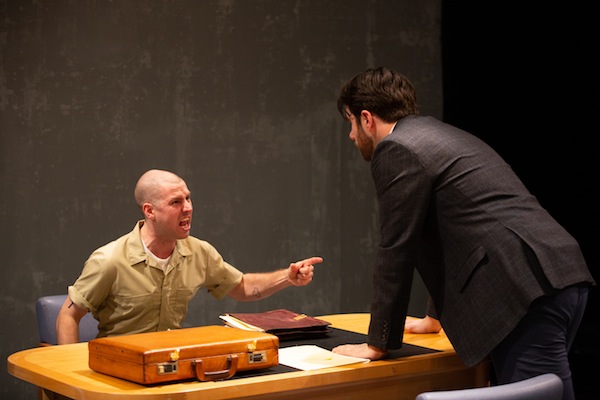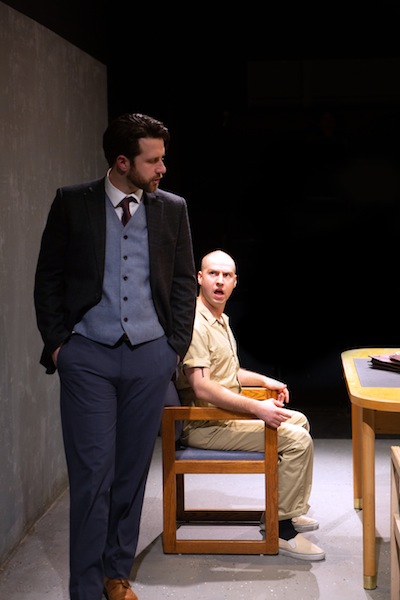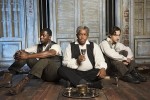Peter Carlone, left, and Tim Carlson in Pacific Theatre’s production of The Hobbit (photo by Chelsey Stuyt)
Need a break from reality? On now at Pacific Theatre is The Hobbit, based on JRR Tolkien’s book, with all its adventure, wizardry, fantastical creatures, and more. The tale is brought to life by two actors “and a dragon’s hoard of theatre magic.”
A world premiere, Pacific Theatre’s The Hobbit was adapted by Kim Selody, with additional dialogue by Tim Carlson and Peter Carlone, the two actors who play multiple characters in the production. The Jewish Independent spoke with stage manager Julia Lank before the show opened on Nov. 15.
“We’re less than a week into rehearsal and already our performers, Tim and Peter, have made me tear up laughing with their creative solutions,” said Lank when asked what her most fun problem-solving moment had been so far. “Telling a story designed for dozens of characters with just two actors poses obvious challenges, and the entire team – including our designers – have jumped in with both feet,” she said. “The room is incredibly playful (this morning we were testing out rolling beer can ‘barrels’ down the aisles of the theatre) and our director, Laura [McLean] is also keeping the magic and wonder of Middle Earth at the forefront. The show is going to be full of surprises, and it feels great to be a part of creating something new together.”

Lank is a self-taught stage manager, though she does have a degree in film production and worked as a first assistant director for several years, which, she said, is the film world’s equivalent of a stage manager.
“Stage management is one of those niche jobs that won’t be on a high school career counselor’s radar, but it’s perfect for me – a mix of technical theatre magic, caretaking, and lots of spreadsheets,” she said. “If you’re interested in how the theatrical sausage gets made and you’re unflappable, stage management might be for you.”
Lank’s recent credits include other Pacific Theatre (PT) productions (Gramma and The Cake), as well as Tuck Everlasting (Arts Umbrella), On Behalf (Fringe), L’Elisir d’Amore (Burnaby Lyric Opera), Jasper in Deadland (Awkward Stage) and City of Angels (the PIT Collective), among others.
“I worked as PT’s marketing assistant and later marketing director from 2017 to 2023,” she said. “I left last June to pursue stage management full-time, but I consider Pacific a theatre home and love the work and people there dearly. I’m also a self-taught marketer, but it’s easy to advocate for an artistic space when you genuinely believe in the work they’re doing. Many of my favourite theatre experiences, both behind the scenes and as an audience member, have been at PT.”
How she prepares for a new project differs, but, in general, she said, “I like to familiarize myself with the script and score well before a show begins so I can anticipate areas that may need extra support or take more time to come together. The director will be doing this work, too, and you want to be in the best possible position to help them execute their vision. And you definitely don’t want to be in a position where you didn’t realize there was going to be a live goat onstage until the first read.”
A good follow-up question would have been whether Lank was referring to The Hobbit when talking about an acting goat, but the JI missed that opportunity. Instead, we asked about how The Hobbit fits into Pacific Theatre’s aspiration “to delight, provoke and stimulate dialogue by producing theatre that rigorously explores the spiritual aspects of human existence.”
“Tolkien was famously opposed to religious allegorical readings of his work, but the Pacific Theatre community has a fondness for his work that stems from his personal religious background,” explained Lank. “Regardless, if you’re a person of faith or not, I think the values of compassion, the rejection of greed and needless violence in favour of communal care and quiet contentment and imagination in this interpretation of the story make Hobbit a perfect PT show.”
As for Lank, she was raised in the local Jewish community and attends Or Shalom.
“Judaism honours my curiosity and taught me that questioning a system can only improve it,” she said. “My Jewish identity calls me to care for the vulnerable, stand up for communities whose voices have been suppressed, and honour the natural world. It’s very important to me.”
Turning back to less serious matters, Lank said of The Hobbit: “It’s going to be a marvelous, silly, scary adventure – you’ll be very welcome to join us in the Shire.”
The Hobbit runs to Dec. 21 at Pacific Theatre. Performance times are Wednesday-Thursday, 7:30 p.m.; Friday-Saturday, 8 p.m.; and Saturday-Sunday, 2 p.m. For tickets, which start at $20, visit pacifictheatre.org or call 604-731-5518.





